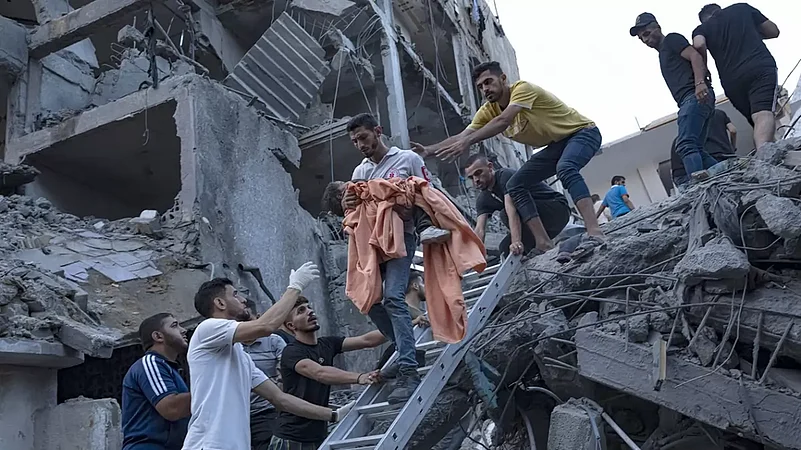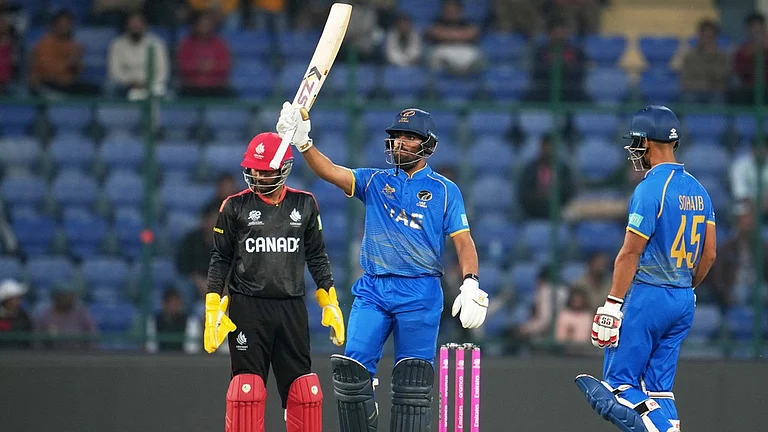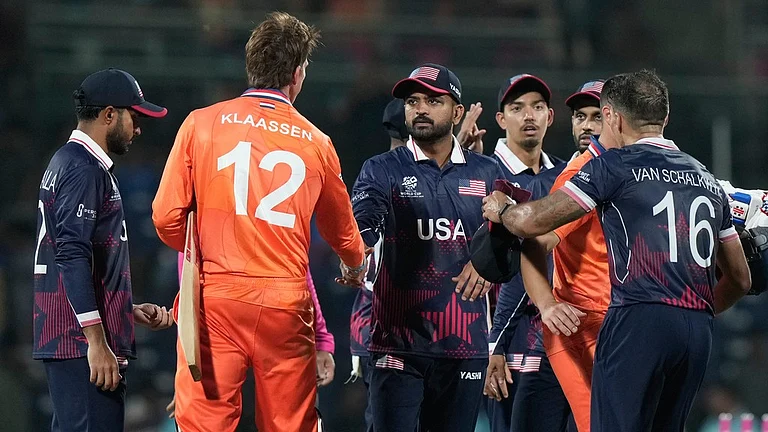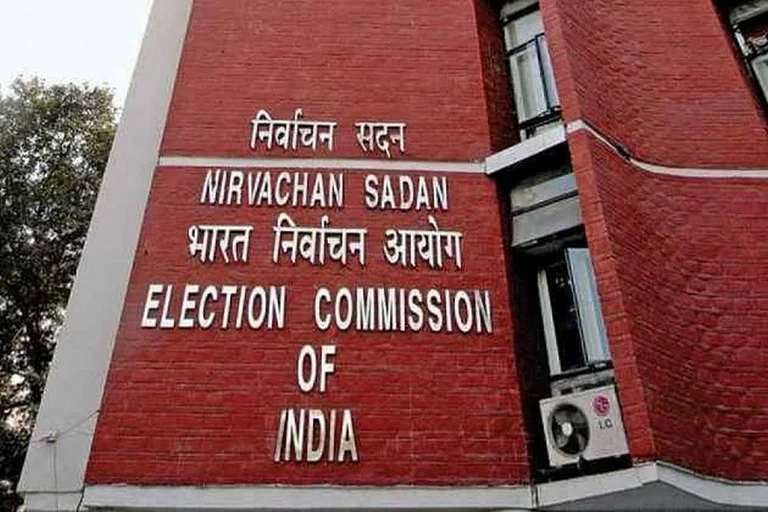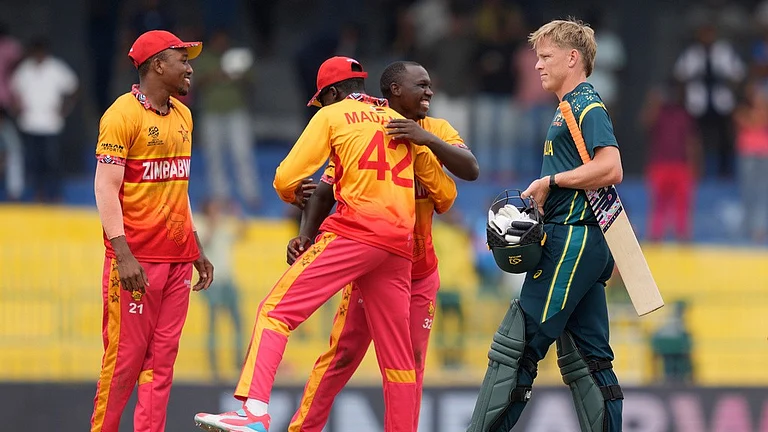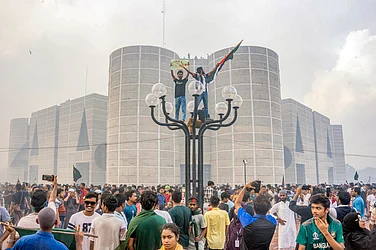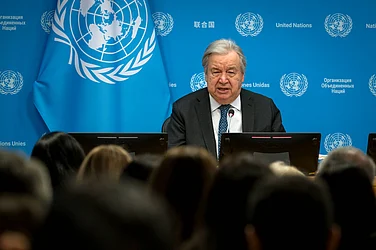More than a million people have fled their homes in the besieged Gaza Strip in the past week, ahead of expected Israel invasion that seeks to eliminate Hamas' leadership after its deadly attack.
The enclave's food and water supplies are dwindling, and its hospitals are warning that they are on the verge of collapse.
Israeli forces, supported by a growing deployment of US warships in the region and the call-up of some 360,000 reservists, positioned themselves along Gaza's border and drilled for what Israel said would be a broad campaign to dismantle the militant group.
Israel said it has already struck dozens of military targets, including command centres and rocket launchers, and also killed Hamas commanders.
Israeli officials have given no timetable for a ground incursion that aid groups warn could hasten a humanitarian crisis in the coastal Gaza enclave.
A week of blistering airstrikes have demolished entire neighbourhoods but failed to stem militant rocket fire into Israel.
The Gaza Health Ministry said 2,670 Palestinians have been killed and 9,600 wounded since the fighting erupted, more than in the 2014 Gaza war, which lasted over six weeks. That makes this the deadliest of the five Gaza wars for both sides.
More than 1,400 Israelis have died, the vast majority civilians killed in Hamas' October 7 assault.
At least 155 others, including children, were captured by Hamas and taken into Gaza, according to Israel. It's also the deadliest war for Israel since the 1973 conflict with Egypt and Syria.
About 500,000 people, nearly one quarter of Gaza's population, were taking refuge in United Nations schools and other facilities across the territory, where water supplies were dwindling, said Juliette Touma, spokesperson for the UN's Palestinian refugee agency.
“Gaza is running dry,” she said. The agency says an estimated 1 million people have been displaced in Gaza in a single week.
The US State Department said Secretary of State Antony Blinken would return to Israel on Monday after completing a frantic six-country tour through Arab nations aimed at preventing the fighting from igniting a broader regional conflict.
President Joe Biden is also considering a trip to Israel, though no plans have been finalised. In a television interview on Sunday night, Biden, who has repeatedly proclaimed support for Israel, nonetheless said he thought it would be a “big mistake” for the country to reoccupy Gaza.
The same day, Israel's ambassadors to the US and UN said the country does not want an occupation. But Israel will do “whatever is needed to obliterate their (Hamas') capabilities”, ambassador to the UN Gilad Erdan told CNN.
Fighting along Israel's border with Lebanon, which has flared since the start of the latest Gaza war, intensified Sunday with Hezbollah militants firing rockets and an anti-tank missile, and Israel responding with airstrikes and shelling.
The Israeli military also reported shooting at one of its border posts. The fighting killed at least one person on the Israeli side and wounded several on both sides of the border.
An Israeli drone fired two missiles late Sunday at a hill west of the town of Kfar Kila in south Lebanon, the state-run National News Agency reported. There were no casualties reported in the strikes, which hit near a Lebanese army centre.
Hezbollah said in a statement that it had fired rockets toward an Israeli military position in the northern border town of Shtula in retaliation for Israeli shelling that killed Reuters videographer Issam Abdallah on Friday and two Lebanese civilians on Saturday.
A Hezbollah spokeswoman said the increased strikes represented a “warning” and did not mean Hezbollah has decided to enter the war.
With the situation in Gaza growing increasingly desperate, the US named David Satterfield, the former US ambassador to Turkiye experienced in Mideast diplomacy, to be special envoy for Middle East humanitarian issues.
US national security adviser Jake Sullivan said on Sunday that Satterfield will focus on getting humanitarian assistance to Palestinians in Gaza.
Hospitals in Gaza are expected to run out of generator fuel within two days, endangering the lives of thousands of patients.
According to the UN Gaza's sole power plant shut down for lack of fuel after Israel completely sealed off the 40-kilometer (25-mile) long territory following the Hamas attack.
In Nasser Hospital, in the southern town of Khan Younis, intensive care rooms were packed with wounded patients, most of them children under the age of 3.
Hundreds of people with severe blast injuries have come to the hospital, where fuel is expected to run out by Monday, said Dr. Mohammed Qandeel, a consultant at the critical care complex.
There were 35 patients in the ICU who require ventilators and another 60 on dialysis. If fuel runs out, “it means the whole health system will be shut down”, he said, as children moaned in pain in the background. “All these patients are in danger of death if the electricity is cut off."
Dr. Hussam Abu Safiya, the head of pediatrics at the Kamal Adwan Hospital in northern Gaza, said the facility did not evacuate despite Israeli orders. There were seven newborns in the ICU hooked up to ventilators, he said. Evacuating “would mean death for them and other patients under our care.”
Ahmed Al-Mandhari, the regional director of the World Health Organisation, said hospitals were able to move some mobile patients out of the north, but most patients can't be evacuated, he said.
Shifa hospital in Gaza City, the territory's largest, said it would bury 100 bodies in a mass grave as an emergency measure after its morgue overflowed. Tens of thousands of people seeking safety have gathered in the hospital compound.
Gaza was already in a humanitarian crisis due to a growing shortage of water and medical supplies caused by the Israeli siege.
“An unprecedented humanitarian catastrophe is unfolding under our eyes,” said Philippe Lazzarini, the head of the UN agency for Palestinian refugees.
Sullivan told CNN that Israeli officials told him they had turned the water back on in southern Gaza. Israel's minister of energy and water, Israel Katz, said in a statement that water had been restored at one “specific point” in Gaza. A spokesman said the location was outside Khan Younis. Aid workers in Gaza said they had not yet seen evidence the water was back.
Israel has ordered more than 1 million Palestinians — almost half the territory's population — to move south. The military says it is trying to clear away civilians ahead of a major campaign against Hamas in the north, where it says the militants have extensive networks of tunnels, bunkers and rocket launchers.
Hamas urged people to stay in their homes, and the Israeli military released photos it said showed a Hamas roadblock preventing traffic from moving south.
Nevertheless, more than 600,000 people had evacuated the Gaza City area, said Israel's chief military spokesman, Rear Adm. Daniel Hagari.
The US has been trying to broker a deal to reopen Egypt's Rafah crossing with Gaza to allow Americans and other foreigners to leave and humanitarian aid amassed on the Egyptian side to be brought in. The crossing, which was closed because of airstrikes early in the war, has yet to reopen.
Israel has said the siege will only be lifted when the captives are returned.






